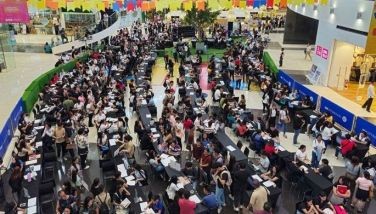In Iran vote, reformists struggle with few options
DUBAI — Despite four years of non-stop pressure, arrests and intimidation, Iran's dissidents still find ways to show their resilience.
Protest messages still ricochet around social media despite Iran's cyber cops' attempts to control the Web. Angry graffiti pops up and then quickly painted over by authorities. Mourners at the funeral of a dissident cleric flashed V-for-victory gestures and chanted against the state.
But just a look at the sidewalks around Tehran's Mellat Park shows how far Iran's opposition has fallen as the country prepares for Friday's presidential election.
Four years ago, girls on rollerblades sped around the park delivering fliers for the reform camp's candidate-hero Mir Hossein Mousavi. Emerald-colored head scarves and wrist bands representing Mousavi's Green Movement were in such demand that bloggers would list shops with available fabric.
This time, there are just a few subdued election placards for candidates considered fully in sync with Iran's ruling clerics. Security forces and paramilitary volunteers are never far away.
Mousavi and other opposition leader, Mahdi Karroubi, are under house arrest and hundreds more activists, bloggers and journalists have faced detention as part of relentless crackdowns since Mahmoud Ahmadinejad's disputed re-election in 2009 brought accusations of vote rigging and something Iran has not seen since the 1979 Islamic Revolution: Huge crowds in the streets chanting against the leadership.
Iran's forces for reform are not so much crushed as now bottled up tightly. Now the election that marks the end of Ahmadinejad's eight-year era also brings another moment of political transition: Whether the loose affiliation of reformists, liberals and Western-leaning activists can somehow remain relevant in a time when the guardians of the Islamic establishment are consolidating their defenses.
"There is no shortage of people in Iran who would like to see a different way of being governed and a different world view from the leadership," said Theodore Karasik, a security and political affairs analyst at the Dubai-based Institute for Near East and Gulf Military Analysis. "Trouble for them is that they now fragmented and disorganized. This is exactly what Iranian authorities want to see."
The entire process has been derided by Western governments and rights groups as a farce after Iran's election overseers — all loyal to Supreme Leader Ayatollah Ali Khamenei — blacklisted former president Akbar Hashemi Rafsanjani from the ballot despite his lofty status as one of the architects of the 1979 Islamic Revolution.
For Iran's rulers, the relatively moderate Rafsanjani represents an unsettling force who could breathe some life into the battered opposition.
Any momentum toward a backlash over Rafsanjani's barring quickly dissipated. He grumbled over the rebuff and Iranian reformist websites buzzed with complaints. But there have been no major street protests, suggesting — once again — there are only remote chances for a revival of the 2009 mass demonstrations. His backers have retreated to election boycott calls or drifted to other candidates who have no apparent intention to shake up the system.
The only significant public show of dissent before the election came in a coincidence of timing. Some mourners at the funeral procession of dissident Ayatollah Jalaluddin Taheri, who died last yesterday in the central city of Isfahan, used the march to revive the opposition chants from 2009 such as "death to the dictator," according to video clips posted on the Internet. But the outburst did not seem to inspire other rallies around the country.
"There is significant opposition in Iran to a lot of things, international relations, crackdowns on the Internet, but its dispersed over all classes of society and without a real focus," said Rasool Nafisi, an Iranian affairs analyst at Strayer University in Virginia. "There is opposition, but I doubt you can call it a movement."
Opposition voters now face the choice of whether to boycott the polls or turn to whatever they see as the least objectionable candidate. So far, the top figures of the reform movement, like former President Mohammad Khatami, have not given an indication to their supporters which avenue to take — meaning a unified strategy may only emerge at the last minute, if at all.
A likely major indicator in the final vote will be how many eligible voters stayed away, in comparison to a reported 85 percent turnout in 2009. It worries officials enough that Khamenei used one of the country's most somber occasions — the memorial ceremony marking the death of Islamic Revolution founder Ayatollah Ruhollah Khomeini — to say that a low turnout will only help Iran's "enemies" such as the US and Israel.
Most of the eight hopefuls cleared to run are bathed in pro-establishment credentials, including such insider figures as top nuclear negotiator Saeed Jalili and Khamenei adviser Ali Akbar Velayati.
Some reformists have migrated toward former nuclear negotiator Hasan Rowhani as a sort of default, since he is closely aligned with Rafsanjani. Khatami's former vice president, Mohammad Reza Aref, has made a strong bid to draw reformist voters, speaking with the most passion about freedoms Wednesday during the second television debate among the eight candidates.
"An unprecedented security atmosphere has been imposed in recent years that caused lack of motivation among students," he said. "The solution is not confrontation, elimination or shutting down. We are living in the age of communications."
Others have gravitated to Tehran Mayor Mohammad Bagher Qalibaf in hopes his hands-on reputation could halt the downward slide of Iran's sanctions-wracked economy.
But there is little sense left of the unified Green Movement that poured onto the streets in 2009 over claims that vote rigging robbed Mousavi of victory and handed re-election to Ahmadinejad. The protests — the worse domestic unrest since the Islamic Revolution — momentarily stunned authorities with once-unthinkable acts of rebellion, such as burning portraits of Khamenei, a full 18 months before even the first hints of the Arab Spring uprisings.
Mousavi and fellow candidate Karroubi have been under house arrest since early 2011. Security forces and intelligence units have been bolstered to the point where any form of dissent — in public or online — risks arrest. Most recently, several people were detained at a Rowhani rally after calling for Mousavi's release.
Iranian police chief, Gen. Ismail Moghadam warned: "Police will confront individuals who have counter-revolutionary behavior."
Authorities have sharply limited visas for Western media to cover the election. Tehran-based journalists also face sweeping restrictions on street reporting and travel. On Thursday, the Paris-based media rights group Reporters Without Borders accused Iranian officials of blocking coverage of the "government's suppression of fundamental freedoms, including freedom of information."
"The regime is showing its true colors," said Abdollah Mohtadi, a member of a London-based opposition group Unity for Democracy in Iran. "When Iranians cannot campaign or give voice to their political views without fear of persecution or prosecution, any claims the regime might make to democracy are shown to be a lie."
Farid Kia, 45, a university instructor in business administration who backed Mousavi four years ago, now says, "Voting is fruitless."
Hossein Yekkeh, a 30-year-old engineer who voted for Mousavi, said he doesn't plan to vote because "none of current candidates represent reformists."
Prominent US-based Iranian blogger Mehdi Saharkhiz — whose father Isa, a well-known journalist, has been jailed since 2009 — has engaged in online debates with Iranians on the value of a mass boycott. Saharkhiz encourages voters to stay away after the rejection of Rafsanjani and in protest of the vote-rigging claims four years ago.
"So you think they won't do it again this time?" he wrote.
Another variable is the deepening Western sanctions over Iran's nuclear program, which may have the indirect consequence of boosting the vote.
Many former Green Movement backers have put ideology aside and have fallen behind candidates, such as Tehran Mayor Qalibaf, seen as capable fiscal managers as the economy reels under 30 percent unemployment and prices rising more than threefold on goods such as chicken and beef. The only sporadic protests in the past years, in fact, have been over pocketbook issues and not the squeeze on political freedoms.
"Is there still an organized Green Movement? No," said Scott Lucas, an Iranian affairs expert at Britain's Birmingham University. "Whatever was there, the authorities have been successful in breaking it up with detentions and crackdowns. But the issues the protesters raised — accountability, political transparency, reforms, openness — are still there and very much alive. They just have no cohesive expression."
- Latest
- Trending





























